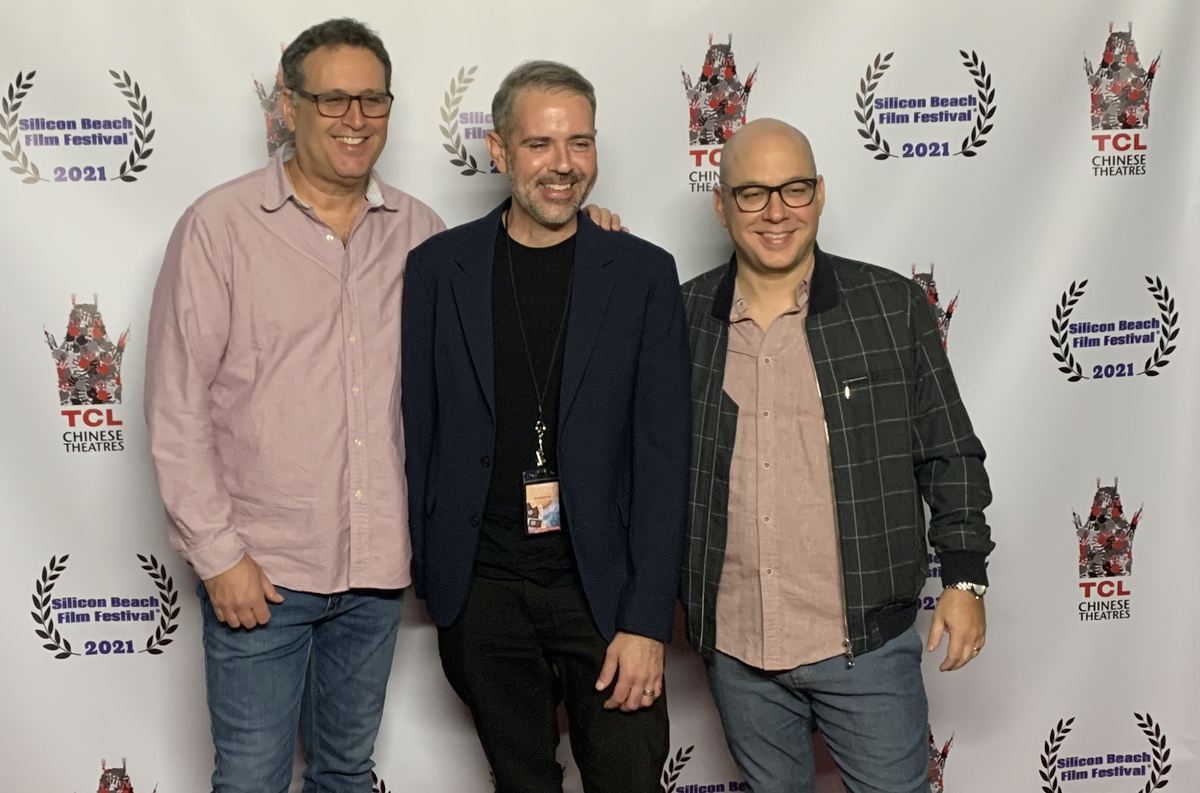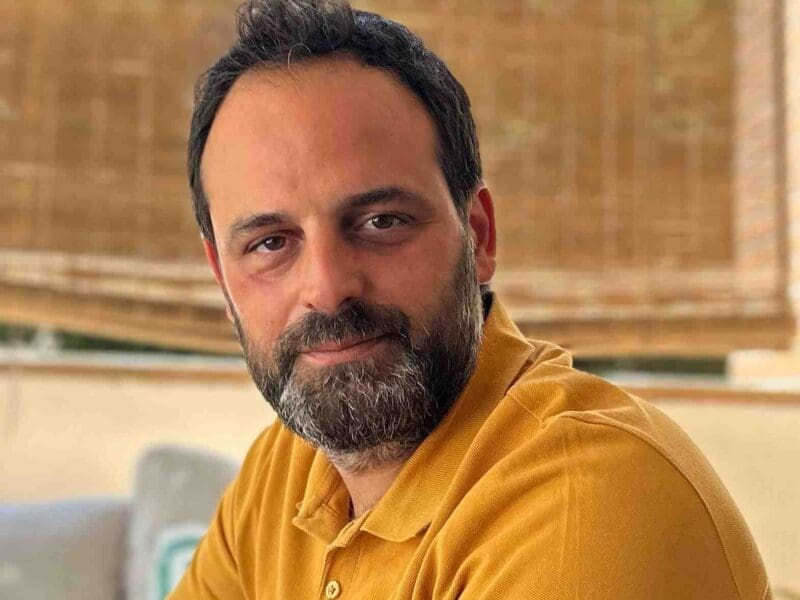
New horizons: Get to know Playworld Pictures founder William Garcia
Playworld Pictures founder William Garcia has helped pave the way for Latinx people in TV and film over the last two decades, and is not slow to tell his story. As time goes on it is becoming clear that Black and Latinx Americans are the majority, and Hollywood has less and less of a choice to resist reflecting that.
We were lucky enough to take more than a few moments with the producer and get some insight into his journey thus far and what more he sees for himself on the horizon.
Tell us about your history in entertainment. How did you start your journey?
I started my journey in broadcasting as a soundman for WTVJ-Channel 4 in Miami, Florida. I wanted to secure a job in the industry while attending Miami Dade College.
I was not qualified for any technical positions at the time, so my focus was on getting in the door and working my way up the ladder. It was a time when you could easily show up at a company’s front door and apply for a job. I filled out the application for a janitorial position but never received a call for an interview.
I would not let that stop me, so I just showed up at the studio for the next few weeks. I must have visited the TV station four or five times. Finally, the human resources executive promised me that if I did not show up again at the station, she’d give me a position in their news department’s sound mixers training program. A few weeks later, I got the call, which was the start of my career.
I was a soundman for the next few years and moved up quickly to the camera department. I spent the following fifteen years shooting/editing news and sports shows for local television programs in Florida.
It was a wonderful and sometimes terrifying time for news in South Florida. I was filming the Space Shuttle missions, Princess Diana, riots in Tampa and Miami, hurricanes, the grand opening of Universal Studios in Orlando, and plenty of drug cartel action.
After fifteen years of working for the networks in news and sports, it was a natural move to reality television for shows like MTV Real World: Miami, Making the Video, HBO’s First Look, and Get Out for HD Net. It was also a dream come true for this “I WANT MY MTV”-generation kid from Hialeah. Having the opportunity to work for MTV was a career-high for me.
I’m a big music fan and living in Miami was also a big plus for working in music. South Florida has always been a hotbed for the music industry, so working with Michael Jackson, Lenny Kravitz, Sean Combs, and Ricky Martin was a daily musical adventure filled with pop and rock stars.
I got to hang out with Michelle Rodriquez during the shooting of “Always on Time” with Ja Rule and Ashanti, wish Ricky Martin a happy birthday on the set of “Nobody Wants to Be Lonely” with Christina Aguilera, and be a vegetarian for a few days with Paul McCartney at the Jackie Gleason Theatre for rehearsals.
I met Michael Jackson’s kids when filming an electronic press kit for his album Invincible at Hit Factory, the old Criteria Recording Studios in Miami.
After my time behind the camera, I was approached by Moving Pictures to oversee the company’s operations, which was the start of my management and producing career. I worked for Moving Picture for over four years and finally decided to start my own company.
My wish was to permanently move to Hollywood; that finally happened about six years ago when my wife, Elizabeth, inspired me to pack up and move to Los Angeles. There, I started producing feature films and narrative series.
You started your career in news and sports. Back then, did you know that you wanted to eventually move into producing?
Due to health reasons, I had to give up shooting for a living. When I started my career in news and sports, I never desired to become a producer. I was focused on my cinematography and camera career, and I truly loved being behind the camera. My dream was to move to Hollywood and become a director of photography for feature films and narrative series.
I was a very popular reality shooter in South Florida; handheld was my expertise, and I worked on some of the top shows shooting in Miami, for companies like MTV, VH-1, Bravo, Discovery, and so on.
You can ask any cameraman – after years of carrying that camera on your shoulders and having that weight on your back, it starts wearing your body down. Most cameramen I know have lower-back problems. Carry a camera on your shoulders for ten hours a day; it happens.
Just ask any reality-TV shooter. I’ve always been steady as a rock on camera, but I started noticing that I was getting a little shaky from time to time, and my back was not what it used to be. “No big deal,” I thought. I was getting older, and that’s what happened with age. That is until I was hired as a shooter for a TV special for Casa de mi Padre, a Comedy Central special starring Will Ferrell.
It was a typically long day of lighting and shooting the show. The director wanted to shoot another shot before lunch. It was already a six-hour day. No biggie – crews are very accustomed for production to “call for grace,” a term used when production requests the crew to continue to work until they finish a shot before having lunch. We had one more set-up to pull off.
I was asked to handhold the shot. I placed that camera on my shoulders as I had for the last twenty years; but suddenly, my hands, arms, and legs started shaking. I could see Will’s eyes open.
“Man, are you ok?” he asked.
He approached me with that “Will Farrell” look on his face. I wanted to laugh at his reaction. The director ran to me with a concerned look. I placed the camera on the floor and sat down. Everyone thought it was just a low blood sugar episode; orange juice and a candy bar were rushed from Crafty.
After about half an hour, I was back to normal, but I knew something was wrong; I’d never had hypoglycemia. It wasn’t until a few months later that a neurologist told me that I had nonessential tremors. I knew that my camera-operating career was over.
One door closed, and another one opened. I’d always been told by producers, line producers, and unit production managers how organized and well-managed my camera and lighting department were during a shoot. I already had been offered to produce a few music videos and commercial gigs, and I had already produced Hot Shots, a series about the fashion industry in South Beach.
The series won an Emmy from the Suncoast chapter of the National Academy of Television Arts and Sciences. I then decided that the best avenue for me was to start producing and directing; it was an easy transition with the management experience I had from Moving Picture and my previous producing assignments.
How did covering topics like the “Cocaine Cowboy” era in South Florida and various NASA missions hone your talents as a storyteller?
Starting my career as a journalist has provided me with a unique perspective on storytelling.
To experience a police vice-squad sting operation, cover a murder scene, and experience firsthand a hurricane destroying an entire town gives a person a unique perspective on their existence. I have met people from many different cultures, races, and walks of life. When you’re able to spend time with real people, you get a short glimpse of an individual’s lifestyle, opinions, and struggles.
Whether you are spending time with a homeless woman on the street or accompanying the ultra-wealthy driving their Ferrari to work; filming the mother searching for her missing daughter or the soldier training in the jungles of Panama; or even spending time with the first lady of the United States or interviewing a white supremacist, those experiences have provided me with a treasure trove of characters and stories to draw upon for my films and series.
My background in journalism has also provided me with the knowledge of how to research a subject for my stories. Knowing the 5Ws + H formula (Who, What, When, Where, Why, and How) helps with journalistic information gathering and can be applied to developing your story and script. This has allowed me to gain a new perspective that has benefited my career and way of life.
You later became the GM for the production company Moving Pictures. What skills did you learn during your time as GM that you’ve carried with you?
When I started in the industry, my focus was television news, promotions, and sports. I worked for television stations across the state of Florida, as well as major networks owned by large corporations with hundreds, if not thousands, of employees – companies like Taft Broadcasting, NBC, Post-Newsweek Stations, and CBS Network.
You were hired for a specific job, and the likelihood of you venturing to another department was slim to none. You would never have your cameraman also work as your accountant.
That all changed when I was hired as General Manager for Moving Pictures in Ft. Lauderdale. This company is one of the most extensive providers of rental equipment, production services, and post-production in South Florida. If you had a production in South Florida, we had something on the shoot. It was an excellent opportunity to venture into a small company that required you to use your entrepreneurial spirit.
It was a busy time at Moving Picture; one minute, you were taking a video assist/sound playback order for the next Lenny Kravitz music video, and next, you were working with Avid Systems for the feature film Bad Boys II, hiring subcontractors for a Pepsi commercial with Shakira, or negotiating rates for the MTV Music Awards.
The job duties went on and on! I was able to learn and master negotiating skills by communicating with producers, line producers, UPMs, and production coordinators.
Managing multiple projects was expected at Moving Pictures, and overseeing the daily ins and outs of running the company was common. The skills that I honed at the company are still at work. The experience provided me with an edge in negotiating the ever-meaningful equipment quotes, and the ability to communicate with different department heads.
I know the gear and how to communicate with the crew on their equipment requirements. It also gave me the experience of negotiating deals that I still use when dealing with actors, writers, and directors’ contracts.
You now run the production company Playworld Pictures. What sets the company apart from its LA-based peers?
What sets Playworld Pictures apart from our LA-based peers is that our primary focus is on producing diverse stories from underrepresented filmmakers and talents. The company’s experience has spanned media from news, sports, documentaries, and live programs to reality shows, commercials, music videos, narrative series, and feature films. This gives us a better understanding of all the different types of media that individuals consume.
Playworld Pictures focuses not just on Latino stories; the company is also developing Asian and Native American stories worldwide. We also focus on producing content for general audiences: utilizing diverse talent both in front of and behind the lens. The company has a diverse experience in all media, and this, I believe, gives us an upper hand over our peers.
How did the name “Playworld” come about and what does it represent?
The name Playworld comes from one of my favorite places as a child. It’s taken from Lionel Playworld, an American toy store chain in the U.S. The toy store was popular during the ’70s and ’80s. When I was a kid growing up in Hialeah, my mom would reward me with a trip to the local toy store on 49th Street. The store had “Playworld” in big orange letters; the logo was a red kangaroo carrying a joey.
If my report card showed As, if it was my birthday, or if I had saved up some money from my part-time work: it was a trip to Playworld. The name represents my inner child creating a make-believe world. I had an extensive collection of Star Wars figures from that store. I’ve never met a child who did not enjoy a toy store. I still own a vast Batman collection, but that’s another story.

How did the story come about for the latest film you produced, Samland?
My brother Michael was attached to the feature film Samland. He pitched me the story and needed help to produce the movie, and I could not say no to my little brother. Samland is a mixed bag of life experiences that writer/director Juan Pablo Reyes lived through: part fiction, part real life.
The other exciting piece of that puzzle was that Juan Pablo’s mother worked in immigration law, which spawned the Green Card idea, that search for a legal way of life by any means necessary, what it truly meant to strive for the American Dream, and how some take that dream for granted. After reading the script and discussing the project with Juan Pablo, I knew I had to get involved with the film.
Samland has ties to you and your Cuban childhood. Do you find it to be more rewarding when you help tell stories that you have a personal connection with?
Samland is a Latino story. The plight of the immigrant is universal, especially among Latinos that have been dreaming of living in the United States. For Cubans, it’s a dream of freedom; for others in South and Central America, it’s a road to a better economic future.
In my work as a journalist in Miami, I’ve known and met people like Paz looking for the American Dream. Being Latino – and being a Latino filmmaker specifically – I find it rewarding to see myself and my culture represented on-screen and to present that to broader audiences who would never otherwise be privy to our community.
It’s not just telling Latino stories, but also making sure that Latinos are represented in mainstream stories with Latino characters. In turn, this changes the bias toward Latinos by telling empowering stories about Latinos, with representation both in front of and behind the camera.
As a producer with lots of different filmmaking experiences, how much creative input do you have in the final product?
The amount of creative input for any project depends on the business structure, the role of the producer, how the film is financed, and if there’s a studio or distributor involved in the movie. I’ve had no creative control over some projects and complete control over other films.
In the feature film Obsession, starring Mekhi Phifer, Brad Dourif, and Elika Portnoy, I had no creative input on the film. My role was as a line producer, and I oversaw the project during pre-production and principal photography.
I was hired by the executive producer early on; I handled the budget, hired department heads, and ensured everything ran smoothly during production. I watched the rough edit during postproduction and gave a few notes, but I had no role in selecting the director, cast, or the film’s final cut.
When I produced Samland, I had creative input from the team of producers and the director. I had creative input on Samland and provided plenty of notes for the final cut of the film.
In H8ters, a series produced by Astronauts Wanted/Sony Entertainment for Full Screen Media, the final creative say was the studio. In television, the executive producer (also known as the showrunner along with the studio or network executives) has the final creative nod on a project.
Now, with The Maids of Havana, I will have complete creative control, from my choice of director and cast to the final cut. Many newbie directors don’t understand that the producers or studios financing the picture have control of the project. It all depends on how the project is developed, financed, and distributed.
Samland premiered at the New York Latino Film Festival and is distributed by Gravitas Ventures in the U.S. and Canada. Have you been pleased with the response to the film?
Samland premiered at the Full Bloom Film Festival in Statesville, North Carolina. From North Carolina, the film traveled to the New York Latino Film Festival. Many festivals had traditional and online screenings of their selected films during the pandemic. We were fortunate that the New York Latino Film Festival selected Samland for an in-person screening. It was a fantastic experience to see our film screened in New York City.
We have been incredibly pleased with the festival response to Samland. The film won Best Narrative Feature at the Full Bloom Film Festival; Best Director, Actor, and Actress at The First Glance Film Festival in Philadelphia; and Best Actor at the Dunedin International Film Festival, to name just a few awards.
We’ve screened in big and small cities alike, and the reception has been so warm, heartfelt, and open. We got a standing ovation in the Deep South and rubbed shoulders with A-listers in NY. It’s been a complete thrill, and we’re excited to see what the rest of the country and Canada thinks of our film.
You’ve worked as a director in addition to a producer. Which hat do you prefer to wear and why?
I’ve been fortunate to have worked as both a producer and director in the entertainment industry. I enjoy the creative decisions that a director has, but the producer’s role is much more enticing; it allows me to develop the project from concept to final cut.
You have the creative authority to develop the story with the writers, hire the director, and select the cast; you’re the person that oversees the entire project. You’re also responsible for the project’s financials, distribution, and business structure. It’s the best of both worlds: creative and business.
Producing is also about the love for the project. Producing is being everyone’s advocate and therapist; often, you spend hours helping a creative or crew member get through the emotional strains of shooting a film, help the director not feel alone, and even soothe an actor’s concerns about a recent breakup.
Producing is about protecting the film’s vision and keeping everyone mentally, emotionally, and physically safe. Producing is not being able to sleep at night but smiling when you see the final cut of your film.
Playworld recently acquired the rights to the novel The Maids of Havana. Do you feel there will be similarities between that film adaptation and Samland, given the subject matter?
The Maids of Havana is a period piece set against a backdrop spanning the Cuban Revolution of the 1960s to the Mariel Boatlift of the 1980s. The story will focus on the life of Marta, a maid in Havana, during and after the 1960s uprising in Cuba.
The project will be filmed in Spanish. Samland is a contemporary story about Paz, his plight as an immigrant looking for a better life, and what he does to enter the United States: marrying Sam, a drug-addicted woman fighting to keep her child. Samland and The Maids of Havana will have no similarities in tone, plot, shooting, or editing style.
They’re two completely different stories that will focus on a different theme.
Do you foresee a time when you return to directing?
I’ve had a long list of experiences directing documentaries, commercials, music videos, and television series. I’ve produced many movies but never directed a feature film. I’m attached to producing, writing, and directing Online with Love, a romantic comedy.
The story is about a young man, Michael, who’s desperate for love and gets friend-zoned by the woman who owns his heart. He travels to Colombia with an online matchmaking service to try and find his soulmate. The film was written by me and was selected by Filmarket Hub for the U.S. Hispanic Showcase.
Filmarket Hub’s new initiative aims to discover emerging Latinx producers, writers, and directors with high-quality stories and connect them with top-tier companies in the industry, including BTF Media, El Estudio, Exile Content, Gaumont, Pantaya, and The Mediapro Studio. Online with Love will be my feature-film directorial debut.
Can you tell us about any other upcoming Playworld projects?
Playworld Pictures is in postproduction for the feature film Rally Caps, directed by Lee Cippolla (The Shift), starring Oscar-nominee Judd Hirsh (Uncut Gems), Amy Smart (Star Girl), and Carson Minerar (Palmer).
We will also have other notable baseball figures appear, such as Orioles’ legend Brooks Robinson and ESPN Baseball Analyst Tim Kurkjian. The film’s screenplay is written by Cippolla, based on the novel written by the father-daughter writing team Stephen J. Cutler and Jodi Michelle Cutler.
Rally Caps follows the true events of a youth baseball player who has his dreams of pitching for a Little League travel team derailed by a devastating injury on the field. The film is set to release in 2023. We also have another eight projects in different stages of development.
What advice do you have for aspiring producers?
“Show business” is just that: a business. Being a producer is very easy and very hard. Every producer I come across has an idea and a script, and every filmmaker needs to find funding and distribution for their film.
I always hear, “I need money for my film,” but when you ask the tough questions on the business side of the project, they have no idea what they need to fund their film or how to pitch their stories to studios and streamers. What’s difficult for producers is the sales and business side of producing.
To be successful, you must have the inspiration, the passion for your project, and the know-how to run a business. Knowing about equity financing, tax credit monetization, and how to market your projects to potential OTT platforms and studios is just as important as developing the story of your film.
My advice to aspiring producers is to learn about the business side of producing and how to develop a project from its conception to selling the movie to distributors. If you hate the business side of producing, find a business partner who’s interested in the business of “show business.”
_
What areas of Hollywood are you inspired to explore after reading William’s story? Let us know in the comments!







